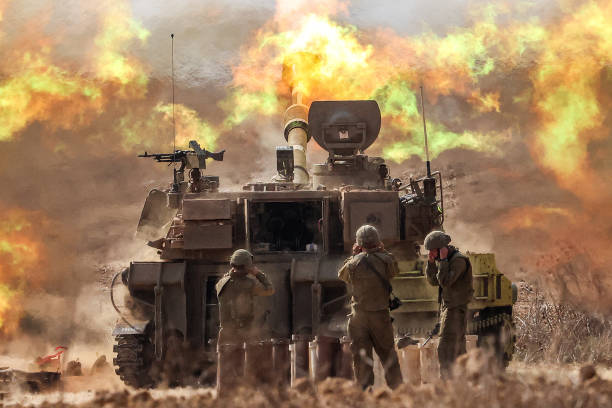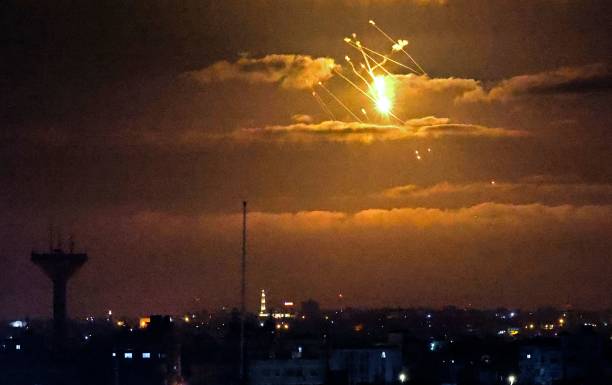Palestinian militants fired 20 rockets on Monday morning toward communities that bordered the Palestinian coastal enclave from the Khan Yunis area of the Gaza Strip, as reported by the Israel Defense Forces (IDF). The militant wing of Islamic Jihad, affiliated with Hamas and supported by Iran, stated that in response to what they termed “the Zionist enemy’s actions against our Palestinian people,” its members launched rockets targeting Israeli communities near the Gaza Strip.
The IDF claimed that they had intercepted some of the rockets, and others fell into open areas of the border. Even the Eshkol Regional Council also reported that similar numbers of rockets were shot at the area encompassing the north of Be’eri and extending to the borders with Egypt and Gaza. However, they added that almost all of them fell in open spaces and no injuries were reported. The incident demonstrated that militants still had missile weapons nearly nine months into an offensive that Israel claims has the objective of neutralizing threats against it.
In the Israeli-occupied West Bank, violence also broke out on Monday. According to the Palestinian Health Ministry, an Israeli military operation in the city of Tulkarm resulted in the deaths of a woman and a boy. An Islamic Jihad member had died the day before as a result of an Israeli strike in the same region.
In certain regions of Gaza, militants continue to stage attacks on Israeli forces, targeting areas that the army vacated months ago. For the fifth consecutive day, Israeli tanks have intensified their incursions into the Shejaia suburb of eastern Gaza City. Locals in Rafah, which is in southern Gaza close to the Egyptian border, said that tanks have also moved forward into the city’s centre and west. There has been a noticeable uptick in military activity with these initiatives.
On Monday, the Israeli military claimed to have engaged in heavy fighting in Shejaia, which led to the killing of several militants. Additionally, they found sizable weapon stockpiles nearby, underscoring the enormity of the fighting and the persistent risks. The continuing conflict in Shejaia and Rafah highlights how precarious and intricate the situation is in Gaza, where new problems are sprouting every day.
Table of Contents
Israel Plans Buffer Zone in Philadelphia Corridor to Counter Palestinian Militants

Israeli official media KAN said on Monday that Israel had revealed intentions to build a “buffer zone” in the Gaza Strip’s Philadelphi Corridor, citing Egyptian officials. The goal of this strategic strategy, which is reportedly supported by the US, is to enhance control and security in a volatile area.
As per KAN, the buffer zone that has been proposed is intended to make it simpler for the Israeli Defense Forces (IDF) to move around without any problems, especially after the present Rafah operation is over. This action is perceived as a tactical attempt to uphold a safe perimeter and stop the smuggling of weapons through the border tunnels and the infiltration of militants.
The creation of the “buffer zone” is an essential part of Israel’s overall effort to reduce security risks in the region. By establishing this controlled area, the IDF aims to enhance its ability to monitor and manage activities, significantly reducing the risk of militant assaults and unauthorized crossings.
This development holds the potential to dramatically reshape the global landscape, altering the dynamics of the Israeli-Palestinian conflict and impacting Egypt’s relations with Israel. As this buffer zone comes into existence, the international community will closely scrutinize its implications, recognizing that it may set a precedent for future security measures in conflict zones worldwide.
The endorsement of this plan by the United States underscores the critical role of international cooperation in fostering stability and peace in the region. It reflects a coordinated effort to address the complex security challenges that have long plagued the area. This initiative not only aims to secure the immediate vicinity but also aspires to create a ripple effect, promoting broader regional stability and contributing to a long-term resolution of persistent conflicts.




1 Comment
Pingback: Israel Airstrikes hits a Gaza school near Abasan, 29 Dead